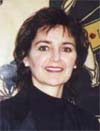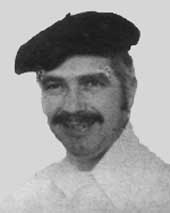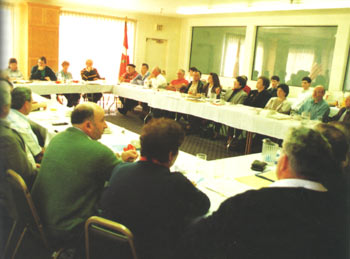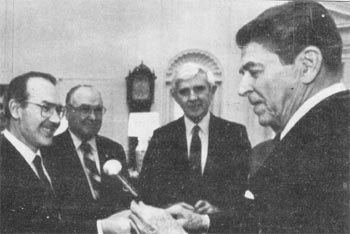

| The North American Basque Organizations, Incorporated | ||||||
| Gloria Totoricagüena Egurrola | ||||||
|
Each of the member Basque organizations is self-funded and does not depend on any public subsidy. Each creates its own fund-raisers, charges a small fee to members, and charges participants for activities. Basque cultural functions are well attended by the non-Basque population throughout California, Oregon, Washington, Nevada, Idaho, Utah, Wyoming, and New York, and the Basque Center events are utilized as an educational tool for non-Basques. However, as the generations are now farther away from the actual emigrant from Euskal Herria, often the Basque Centers and clubs must educate their own members concerning Basque topics from the homeland. Many Basques in the United States do not know anything about the history of their ancestors' emigration from Europe, nor are they familiar with the history of Basques in the United States.
There are currently thirty-five different Basque organizations in the United States that are members. The Vancouver, Canada club is also associated with NABO and its members are invited to participate in collective functions and celebrations. In 2002, another group of Basques from Montreal have also inquired about joining the NABO. Each Center has its own history and particular interests, but all share in the common goal to preserve the Basque language and Basque culture. All have elected Boards of Directors who serve voluntarily, and have various committees of volunteers who organize dinners, dances, euskara classes, Basque cuisine classes, choirs, dantzari taldeak, tournaments of mus and briska, and pelota championships. NABO's function is to sponsor activities and events beyond the scope of the individual clubs, and to promote exchanges between Basque-Americans and the Basque Country. The three major inter-club events are the annual handball tournament, the annual mus tournament, and a summer music camp for Basque youth called "Udaleku". The first regional pelota tournament was held in 1976, and in 1981 players representing NABO traveled to Mexico City for the amateur world championships. The mus tournament followed in 1977, and NABO soon hosted the world mus championship in San Francisco (1979) Las Vegas (1986), San Francisco (1997), and Boise (2001). NABO has also created networks with the Basque Autonomous Community's government and various institutions, as well as those in Nafarroa and Iparralde, which have provided many clubs with educational materials, performers from the Basque Country to enliven festivals, language teachers, and scholarships for university studies, and grants for Basque Center projects. It does have good relations with the government of Euskadi and the Office of Relations with Basque Communities Abroad in the Lehendakaritza. Several institutions in Iparralde have relations with NABO clubs, mostly those in California, for sending pelotaris, chefs, language teachers, and dance instructors. There have been fewer contacts or exchanges with institutions in Nafarroa. The financial support for NABO activities comes from membership dues, fees, various-fundraising events such as publishing and selling the Basque calendars, Basque Government grants, and from donations. Delegates from each club meet three times a year. The annual convention for the election of officers is held during the summer, hosted by one of the clubs to coincide with their festival. Its annual activities include the Udaleku, similar to the adolescent colonias offered to teenagers in the Basque Country. The first NABO music camp was held in 1977. That year three separate camps were organized: one in San Francisco, one in Reno, and one in Boise, under the spirited leadership of the late Jon Oñatibia. In 1978 the regional camps were combined into one, and the following year Luis Manuel Pe-Menchaca arrived from Europe to teach the txistu, beginning many years of loyal and dedicated service to the Basques of the United States. In the 1990s, various instructors from Euskal Herria and from around the United States have served as instructors for the participants. The NABO Udaleku program offers two weeks of instruction in Basque dancing, singing, accordion, tambourine, mus, pelota, history, cuisine, txalaparta, and language. Many of othe youngsters are third or fourth generation Basques who do not have much knowledge about Euskal Herria or about Basque culture except to know that they are Basque by heritage. This camp gathers Basque youth from around the United States and gives them the opportunity to meet other Basques of their own age, to learn new information and skills that they can then take back to their own Basque communities in order disseminate the knowledge. The number of Udaleku participants varies from 40-80 and the camps are held in the summer, rotating between different clubs in Wyoming, Utah, Idaho, Nevada, and California. The 2002 Reno, Nevada camp had seventy-one students.
The Kantari Eguna is held in Gardnerville, Nevada and is enjoyed by all music lovers. Bertsolaris, choirs, and instrumental musicians participate with pieces of original music and lyric, and also with established Basque music. In some years there have been competitions with prizes and in others, the artists perform for exhibition only. NABO organizes an annual pelota championship with players from the Centers in California, Idaho and Nevada. Though several of the Centers in other States have frontons, many are in disrepair and there are not enough players who can practice in order to compete. Mus tournaments are the highlight of the year for many members with each club organizing their own tournament to send their winners on to the NABO National Championships. The winners of the NABO tournament then participate in the International World Mus Tournament. The 2001 World Mus Tournament was held in July at the euskal etxea in Boise, Idaho. An annual calendar project displays photography from the homeland and from events of the United States Basques' activities. The calendar mixes French, Spanish, Euskara, and English and notifies of all clubs' events, summer picnics, dances, and annual festivals. The newsletter Hizketa is published three times a year and besides giving current events information regarding NABO and individual NABO clubs, it also educates the reader on topics of euskara, and homeland history, anthropology, and culture. Individual diaspora Basques are interested in the movement for euskara, and NABO promotes language classes in each of the member organizations. Several clubs have Basque language classes and Boise has its own ikastola for twenty-seven children, ages 3-7.
The number of Basque organizations in the United States is actually increasing, as are the membership numbers of those affiliated with Basque Centers and associations. In the 1980's there were twenty member clubs of NABO, and in 2001 there are thirty-five clubs. Basques in the United States are enthusiastic about educating the public in regards to Basque language, culture, history, and traditions. When the Lehendakari Ardanza stated that the Basques in the diaspora are Euskal Herria's ambassadors, he spoke a truth with enormous yet untapped potential. Gloria Totoricagüena Egurrola Center for Basque Studies University of Nevada Reno |
Euskonews & Media 193. zbk (2002 / 12 / 20 - 2003 / 01 /10)
Dohaneko harpidetza | Suscripción gratuita | Abonnement gratuit |
Free subscription
Aurreko aleak | Números anteriores | Numéros précedents |
Previous issues
Kredituak | Créditos | Crédits | Credits
Euskomedia: Euskal Kultur Informazio Zerbitzua
Eusko Ikaskuntzaren Web Orria
webmaster@euskonews.com
| QUIENES SOMOS | Política de privacidad | Avisos Legales | Copyright © 1998 Eusko Ikaskuntza |



